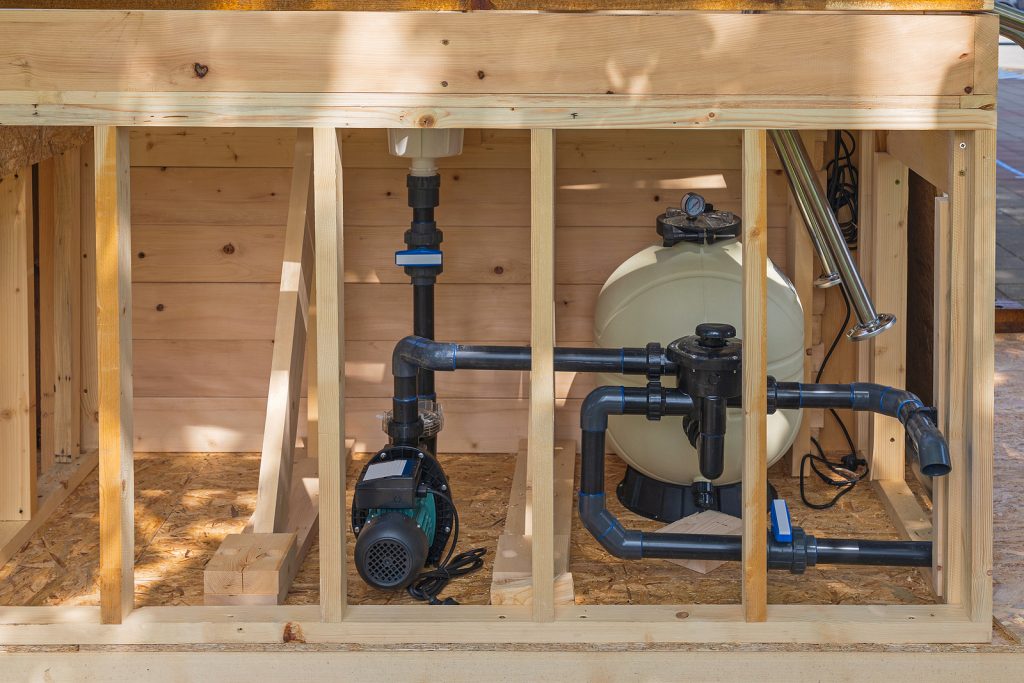Pool Heater vs. Heat Pump
The only thing better than having a pool in Dallas is having a pool in Dallas that you can use year-round. As warm as Texas weather can be, pools still get cold half the year. However, if you heat your pool, your swimming season can begin earlier in the spring and extend later into the colder months.

If you’re looking into heating your pool, there are two pieces of technology to consider. You can go with a traditional heater or a heat pump. Understanding how each one works is critical to make an informed decision about your pool. Below, the experts at Select Pool Services explain both heating systems.
Initial Considerations
Before committing to getting a pool heating system, there’s something important you should understand. At the pool equipment area, if you do not already have a source of energy intended for heaters, be aware that making such a modification is at least as costly as the price to install any heater.
Heat pumps cannot run off the same electrical circuit as the pool pump; they require a dedicated circuit with a much higher amperage/wire size rating. Gas heaters have an electronic board and fans that can be tied to the pool pump circuitry, but the cost to run a new, dedicated gas line from the meter to the equipment can be high. The cost of gas line installation always depends on the length of the run, the obstacles, and whether the whole gas plumbing system is leak-free. Plumbers are required to test the gas for the whole house when adding to the gas meter.
What Is a Pool Heater?
A pool heater works similarly to a central heater in a home. It uses natural gas, liquid propane, or electricity and heats the water as it passes through the unit. The heater has a chamber where the flame burns, and water that has been pumped from the pool passes over that chamber, transferring heat. The water is then returned to the pool and raises the temperature of the water. Because pool heaters use direct heating, they have pros and cons for how they function.
Pros of Pool Heaters
The first pro of a heater is the up-front cost. Heater technology has been around for a long time, so units are available at affordable prices. Heaters are relatively easy for your pool service to install and maintain. For a natural gas heater, as long as you have access to a gas line, installation is straightforward. Heater installations with propane or electricity are even easier.
Perhaps the best benefit of heaters is how they work. Direct heating is fast, and that means they can raise the temperature of the pool very quickly. Also, they work in any weather. That means if the outdoor temperature is in the 70s or the 30s, the heater will work.
Cons of Pool Heaters
There are a couple of disadvantages to using a traditional heater. One is the operational cost. You need an ongoing stream of gas or electricity to fuel the heater, and the fuel cost can add up pretty quickly. Also, a heater has more moving parts than a heat pump, increasing the potential number of failure points. While heaters are built to last, they usually need more maintenance or earlier replacements than heat pumps.
What Is a Heat Pump?
A heat pump uses electricity, but it doesn’t make heat. That’s right – a heat pump does not create heat. It pulls warmer air from around the unit and into the water by using a refrigerant. Think about it like an air conditioner – but in reverse. It can be a little confusing, but what’s important to know is that a heat pump is very efficient in transferring heat to the water. However, since it relies on warm air, it tends to be ineffective in colder temperatures.
Pros of Heat Pumps
The most significant advantage of a heat pump is that it saves money in operational costs. It turns out that refrigerant heating is much more efficient than using an electric resistor, and the pump is definitely more fuel-efficient than natural gas or propane. In addition to saving you money, the operational efficiency is environmentally friendly too.
Heat pumps are easy for your pool service to install. They don’t have much in the way of moving parts. This allows them to last longer, and they require very little maintenance.
Cons of Heat Pumps
The first thing you will notice when shopping for a heat pump is that they tend to cost much more than traditional heaters. You may recover this money in the long run, but the initial investment for a heat pump is much higher.
Remember, the heat pump relies on warm air in the atmosphere. If there is no warm air, the pump has no heat to pull in. If the air temperature gets below 50 degrees Fahrenheit, the unit will not function properly. Colder temperatures will not damage the heat pump, but below 50 degrees, it provides no heat.
Finally, heat pumps are nearly twice as large as any gas heater you will find and require an area free of other appliances. You cannot place one near air conditioning units. Therefore, most equipment areas do not have room for anything but a gas heater, many of which need very little room for installation. At Select Pool Services, we have well-trained experts certified and licensed to install and repair pool heaters of all brands and models. You want to work with an expert to ensure proper installation. There’s nothing worse than putting your swimsuit on and getting ready to cannonball into the warm water just to find that the water is icy cold. Select Pool Services won’t let that happen. Contact us online or call 214.755.7665 today!
